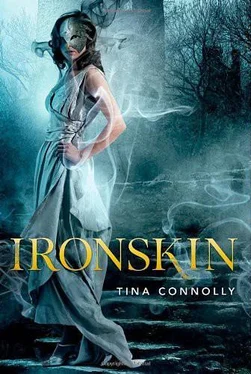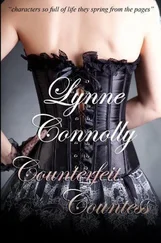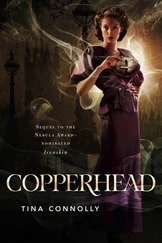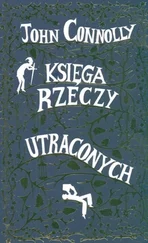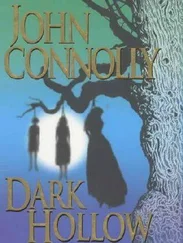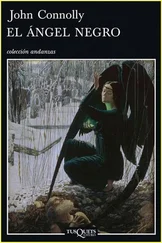Jane drew away, turned her iron cheek into the shadows. Anger and strange hungers bubbled inside her, so to hide them she looked at the wall and said, “I see you’ve made none with war scars.” There were poxed cheeks, there were knife scars. But there were no masks blotched red, ridged and bubbling as if death crept beneath them. No victims of the fey.
Maybe even he couldn’t stand that much ugliness.
“I show the worst in people,” he repeated. “Not the best. Not bravery.” He was near again. He touched a bare spot on her jaw, and his fingers were warm and flecked with clay dust. “You were trying to protect someone; I’m sure of it.”
Jane set her lips and pulled back, turning away from that touch, that level gaze. Warm looks he couldn’t mean; invasive words that flicked her wounds.
No options.
The workbench in the center of the room was covered in tools, paints, glue. A damp towel covered a mound on the workbench; a lump of clay sat in a white-grey bucket of water. White and pink dust was everywhere. “Are you working on something new?”
“As always.” He drew aside the damp towel to reveal the start of a mask. At this stage it did not look ugly. He was still shaping its basic contours: cheekbones and chin, and the eyes were merely two depressions of his thumb.
“A mask you cannot look through,” said Jane. She imagined wearing a mask like that, imagined her own iron creeping over her eyes, her nose, her lips. The thought was suffocating, and not just from the imagined lack of air. “Your eyes sealed shut.”
“Perhaps there are more masks like that than we think,” he said. He covered it with the cloth, his fingers gentle around its form. He studied the cloth-covered mask as he said: “I am sorry I have not been back to help you. My work—”
“You are busy,” Jane said. She was helping him out, granting him excuses. Anything to avoid revelations of truth, which would be—what? He did not know how to help Dorie, he did not want to see Jane.…
“Tell me now,” he said. “How have you and Dorie been getting on? Have you made progress?”
“Not so much,” Jane admitted. She weighed all the frustrations and decided not to admit defeat just yet. “She is speaking a little more to me now.”
“She trusts you, then,” said Mr. Rochart.
“I don’t know about that,” said Jane, “since I keep trying to get her to do things she doesn’t want to do. Perhaps I am familiar now, is all. I know she understands everything I say—she could speak in full sentences, if she wanted to.” She remembered that shadow slipping into the forest. “She talks of you sometimes. Says she sees you from the window.”
The lines of his mouth fell; a weariness crept over his cheeks. A tiny shake of his head. With an effort he roused himself and said, “But tell me, Jane, what matter of import weighs on your mind? A letter, you say?”
“From my sister,” Jane said, recalling herself to her mission. “She is to be married quite soon—within the week, in fact. She wishes me to be there, and indeed, I wish it myself.” Jane found herself slipping into the archaic language he so often used.
The weariness returned. “You would give up on us so soon,” he said.
“No!” said Jane. She remembered her frustrations with Dorie and felt sharp guilt. “No,” she repeated. “This is not an invented dying aunt, I swear it.” She held out the engraved notice to show him. “I had thought it would be a couple months from now.”
He did not look at the invitation, but instead leaned in closer. “Decades ago, before the Great War, there was still trade with the fey. Contact, even if it was rare and limited to your friend’s cousin, your neighbor’s father. Those bluepacks were everywhere, ran all the trains and streetlights, trolleys and gramophones, and yet you never knew anyone personally who had met the fey—it was always a friend of a friend, or a faceless business who shipped the lights and bluepacks to the local stores. Stories about the fey spread, of course. Some compelling, some disturbing; and if you saw a fey at a distance, wearing a human shape—well, you never quite knew if all the stories of curses and stolen children were true or slander. The tales of the fey were fireside tales to entrance your friends and family, and not gruesome fodder for the newspaper.”
Jane nodded, uncertain what this had to do with her leave of absence.
“There was one tale of a lass who was tricked into staying with a ruined man,” he continued. “A human man, who had been cursed by the fey. A damaged man, nearly a beast. When this girl goes home for a visit, he bids her promise to stay only a week, for without her he will surely fade and die, return to the clutches of the fey that once claimed him.…”
She could not fathom this despairing mood, but she liked it little. It poured from him like a poison, clutching at her throat, overpowering even her rage. From a distance she heard herself saying, “The circumstances are very alike, then. For I clearly see your beastly fangs and sharpened claws.”
Mr. Rochart straightened. Laughter broke through the somber expression. “Go to your wedding,” he said. “I will not even hold you to the beast-man’s promise, make you swear to return to me.”
“No?” said Jane.
“No. I will fetch you home myself.”
Six days later, Jane sat on a pink tufted stool in Helen’s new sitting room, watching her sister flit back and forth. Fair Helen, lovely Helen, pink and white, unscarred Helen was dressed in nightclothes that looked like pre-war underclothes: a white chemise and bloomers, both heavily worked with eyelets and satin ribbons. Strange to think how sharply fashions had changed in one decade after seemingly centuries of head-to-toe layers. Dresses were sleeker and clingier by the day; glimpses of legs were displayed in the thinnest stockings you could afford (and oh, weren’t stockings dear these days as the factories all labored to make coal and steam technology work as efficiently as the bluepacks once had). Soon, Jane reflected, they would all wear nothing at all, and yet her head would still be swathed in mask and hat and veil.
Helen’s copper-blond hair streamed free, her big brown eyes batted lashes at Jane. “The pearl combs or the tortoiseshell, Jane? Why won’t you make me choose?”
“I thought you had chosen,” said Jane. She was seated next to the fireplace. The fire felt lovely, warm—too warm on her iron cheek. She turned her face away from the blaze. “The tortoiseshell, then,” she said. “To offset your hair.”
Helen held one up, then dropped it on the rosewood vanity with a sigh. “No, the pearls, of course. It has to be pearls for a wedding. Come twist them in, will you?”
Jane obeyed. She always obeyed Helen on the little things. It was easier that way. And yet no matter how many small battles she let Helen win, Helen fought just as hard on the big ones. And there met Jane’s temper, and called Jane stubborn, no matter how stubborn Helen was herself.
“It’s a lovely mirror,” said Helen. “Not all wavy and silvered like ours was in the flat.”
Jane twisted the copper-blond curls over her finger, carefully not looking at the mirror.
Helen shifted, disrupting Jane’s hands. “And my rooms are lovely, don’t you think so? Did you see the fixtures for the gaslight? I selected them. All on my own.”
“Hold still.”
“Ouch,” said Helen, and her fingers flew in the way of Jane’s and back down. “I said, aren’t you fond of my rooms?”
“I’m not sure why you’re here in these rooms before the wedding,” said Jane. “Since you asked.”
“Don’t be prim,” said Helen. “Nobody here thinks anything of it.”
Читать дальше
